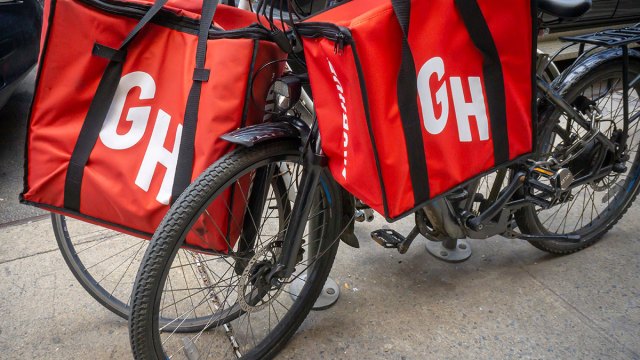Featured on eatthis By Mura Dominko
Grubhub is being sued for allegedly listing 150,000 restaurants on its popular delivery platform without their consent. In the class action lawsuit filed in federal court this week, the company is also accused of using “sketchy” tactics to conceal the identity of drivers picking up the unverified restaurant orders.
Two restaurants filed the federal lawsuit on behalf of tens of thousands of others whose names and logos it claims had been added to Grubhub’s platform without permission. Though the practice was outlawed in California last month, it is still widely used by several third-party delivery companies to beat out competition. (Related: 9 Restaurant Chains That Closed Hundreds of Locations This Summer.)
The businesses accused Grubhub of violating federal trademark laws, as well as cannibalizing their online presence. Though they had no oversight of the delivery process, the restaurants were allegedly blamed for issues with Grubhub orders they didn’t even know they were fulfilling.
“Consumers understandably blame the restaurants, who they think have partnered with Grubhub to provide them with accurate, reliable, and timely service,” the lawsuit reads. “The end result for restaurants is significant damage to their hard-earned reputations, loss of control over their customers’ dining experiences, loss of control over their online presence, and reduced consumer demand for their services.”
So how is it even possible for Grubhub to pick up an order from a restaurant to be delivered without the establishment’s knowledge? According to the lawsuit, Grubhub instructed drivers to “act as if they were a diner” picking up an order. Moreover, the drivers were allegedly treated as third-party pawns who were not only tasked with delivering orders to the customers but also figuring out how to place them in the first place.
“The order doesn’t go directly to the restaurant. It goes instead to a Grubhub driver, who must first figure out how to contact the restaurant and place the order,” the lawsuit adds. “Sometimes it’s possible to place orders with the restaurant by phone, but other times the restaurant will only accept orders in person. The extra steps often lead to mistakes in customers’ orders and often the restaurant won’t receive the order at all.”
The two restaurants who filed the lawsuit on behalf of thousands of others—The Farmer’s Wife in Sebastopol, Calif., and Antonia’s Restaurant in Hillsborough, N.C.—alleged the practice went beyond innocently expanding the platform’s searchable database with non-partner restaurants, which is how CEO Grubhub’s Matt Maloney seemingly presented it last October. According to the plaintiffs, the delivery platform hurt their business by listing nonexistent menu items and wrong prices. Sometimes, they would allegedly even list restaurants that don’t offer takeout.
The lawsuit is asking for Grubhub to end its practice of adding non-partner restaurants, pay damages, and “turn over its ill-gotten gains.”


